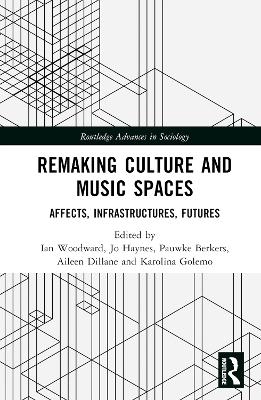
Remaking Culture and Music Spaces
Routledge (Verlag)
978-1-032-18496-8 (ISBN)
This collection analyses the remaking of culture and music spaces during the ongoing COVID-19 pandemic. Its central focus is how cultural producers negotiated radically disrupted and uncertain conditions by creating, designing, and curating new objects and events, and through making alternative combinations of practices and spaces.
By examining contexts and practices of remaking culture and music, it goes beyond being a chronicle of how the pandemic disrupted cultural life and livelihoods. The book also raises crucial questions about the forms and dynamics of post-pandemic spaces of culture and music. Main themes include the affective and embodied dimensions that shape the experience, organisation, and representation of cultural and musical activity; the restructuring of industries and practices of work and cultural production; the transformation of spaces of cultural expression and community; and the uncertainty and resilience of future culture and music.
This collection will be instrumental for researchers, practitioners, and students studying the spatial, material, and affective dimensions of cultural production in the fields of cultural sociology, cultural and creative industries research, festival and event studies, and music studies. Its interdisciplinary nature makes it beneficial reading for anyone interested in what has happened to culture and music during the global pandemic and beyond.
Ian Woodward is Professor of Cultural Sociology at Syddansk Universitet, Denmark. He is an internationally recognised scholar in the sociology of consumption and material cultures, the sociology of cosmopolitanism, and aspects of cultural production and consumption in contemporary music economies. Most recently, he was co-editor of The Oxford Handbook of Consumption, and his books include Labels: Making Independent Music, The Sociology of Cosmopolitanism, The Festivalization of Culture, and Vinyl: The Analogue Record in the Digital Age. Jo Haynes is Associate Professor in Sociology at the University of Bristol. Her research focuses on the sociology of popular music, ethnicity/race, diversities, and cultural work, (digital) entrepreneurship; and the cultural industries. She has published a research monograph called Music, Difference and the Residue of Race and has published in leading journals including British Journal of Sociology, Cultural Sociology, and New Media & Society. Pauwke Berkers is Professor of Sociology of Popular Music in the Department of Arts and Culture Studies, Erasmus University Rotterdam. He is an expert in the study of inequalities in arts and culture—particularly race/ethnicity and gender. He has published in leading journals in sociology and gender studies. Berkers has coordinated several national and international research projects. Aileen Dillane is Senior Lecturer in Music at the University of Limerick. Her research interests include local/global Irish musical identities, protest music, and music festivals. Select publications include the co-edited volumes Songs of Social Protest: International Perspectives (2018), and Public and Political Discourses of Migration (2016). Karolina Golemo is a sociologist of culture, and Assistant Professor at the Institute of Intercultural Studies, Jagiellonian University in Krakow. Her research interests focus on cultural diversity of Italy, Spain, and Portugal; cross-cultural identities and integration of immigrants’ descendants, migrants and artistic expression; music in intercultural relations; and postcolonial relations in cultural perspective.
Introduction: Making sense of culture and music space during and beyond the pandemic
Part I: Affects
1. Festival atmospheres: social, spatial, and material explorations of physically distanced festivals
2. How live is live? COVID-19, live music and online performances
3. ‘Like a winter without Christmas’: Interaction rituals and the disruption of the Roskilde Festival
Part II: Infrastructures
4. Curating listening: The cultural production of a (commercial) experience
5. Reconceiving spatiality and value in the live music industries in response to COVID-19
6. Out of office: The broader implications of changing spaces and places in arts-based work during the COVID-19 pandemic
7. The sounds of silence: Concerts, musicians, and the COVID-19 pandemic
8. Self-organisation in musicians’ collective workspaces before, during and after COVID-19: A model for moving forward?
Part III: Spaces
9. A sonic paradise in the countryside: Pop-rock festivals as drivers of creative tourism development in small cities and rural areas in the post-pandemic era
10. Refiguring pathologised festival spaces: Governance, risk and creativity
11. Experimenting with adulthood in the time of pandemic: The 18th edition of the Sacrum Profanum festival in Cracow
12. The island of freedom on the Vltava
13. The moral complexity of organising a civically engaged festival during the COVID-19 pandemic
Part IV: Futures
14. Unknown futures: Towards a more resilient Dutch popular music sector
15. At the juncture of the liminal and the neo-liberal: Can the smaller, independent commercial music festival survive into the future?
16. Regions in recovery? The significance of festivals for regenerating and reimagining regional community life
17. Music missionaries: How Dutch music festivals utilised the pandemic to bounce forward
| Erscheinungsdatum | 28.10.2022 |
|---|---|
| Reihe/Serie | Routledge Advances in Sociology |
| Zusatzinfo | 3 Tables, black and white; 6 Line drawings, black and white; 5 Halftones, black and white; 11 Illustrations, black and white |
| Verlagsort | London |
| Sprache | englisch |
| Maße | 156 x 234 mm |
| Gewicht | 680 g |
| Themenwelt | Kunst / Musik / Theater ► Musik ► Allgemeines / Lexika |
| Kunst / Musik / Theater ► Musik ► Pop / Rock | |
| Medizin / Pharmazie ► Medizinische Fachgebiete ► Psychiatrie / Psychotherapie | |
| Sozialwissenschaften ► Soziologie ► Mikrosoziologie | |
| ISBN-10 | 1-032-18496-5 / 1032184965 |
| ISBN-13 | 978-1-032-18496-8 / 9781032184968 |
| Zustand | Neuware |
| Informationen gemäß Produktsicherheitsverordnung (GPSR) | |
| Haben Sie eine Frage zum Produkt? |
aus dem Bereich


